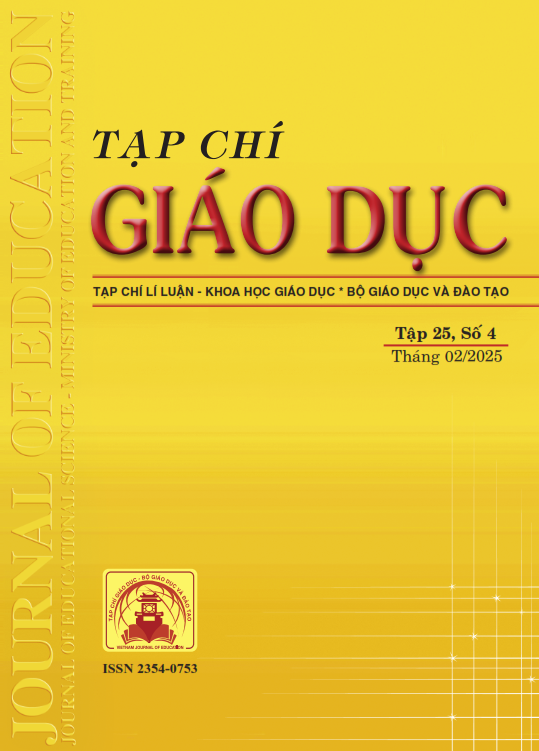Thực trạng vận dụng phương pháp phân tích hành vi ứng dụng (ABA) trong can thiệp cho trẻ tự kỉ tại các trung tâm hỗ trợ phát triển giáo dục hòa nhập
Tóm tắt
Recently, intervention methods for children with autism such as Picture Exchange Method (PECS), Applied Behavior Analysis method (ABA) have been proved relatively effective. This study focuses on the ABA method, which is not only an intervention approach but also a comprehensive system of techniques and strategies grounded in the principles of behavior analysis. The research employs a semi-structured survey methodology, using questionnaires and interview questions (conducted with two experts), discussions with teachers at inclusive education support centers, and a case study involving one child with autism at the Vietnam Friendship Village. This study aims to examine the awareness and ability to apply the ABA method at inclusive education support centers in Hanoi. Survey results indicate that the teachers perceived ABA as a method that alters behavior by addressing antecedents and consequences of the child's actions. The most frequently used technique by teachers is “observing and recording the frequency of the child’s behavior (event recording)”. The primary challenge faced by teachers is that “ABA is implemented in small, discrete steps, leading to fragmentation”. The paper proposes solutions for applying ABA in practical interventions, including collaboration with families for behavior management and integrating ABA with other intervention techniques to enhance the effectiveness of care and support for children with autism. The widespread application of ABA in intervention for children with autism also contributes to raising awareness and supporting families in their journey with their children.
Tài liệu tham khảo
Anderson, S., & Romanczyk, R. (1999). Early Intervention for Young Children with Autism: Continuum-Based Behavioral Models. Research and Practice for Persons with Severe Disabilities, 24, 162-173. https://doi.org/10.2511/rpsd.24.3.162
Fennell, B., & Dillenburger, K. (2016). Applied behaviour analysis: What do teachers of students with autism spectrum disorder know. International Journal of Educational Research, 87, 110-118. https://doi.org/10.1016/J.IJER.2016.06.012
Hoang, V. M., Le, T. V., Chu, T. T. Q., Le, B. N., Duong, M. D., Thanh, N. V., Pham, V. T., Minas, H. & Bui, T. T. H (2019). Prevalence of autism spectrum disorders and their relation to selected socio-demographic factors among children aged 18-30 months in northern Vietnam. International Journal of Mental Health Systems, 13, Article 29. https://doi.org/10.1186/s13033-019-0285-8
Khaleel, Y. F. (2019). Assessing the Knowledge Level of Teachers of Children with Autism Spectrum Disorder about the Importance of Applied Behavior Analysis (ABA) Strategies in Zarka City. International Education Studies, 20(5), 120-132. https://doi.org/10.5539/IES.V12N5P120
Leaf, J. B., Cihon, J. H., Ferguson, J. L., Weinkauf, S. M. (2017). An Introduction to Applied Behavior Analysis. In: Matson, J. (eds) Handbook of Childhood Psychopathology and Developmental Disabilities Treatment. Autism and Child Psychopathology Series. Springer, Cham. https://doi.org/10.1007/978-3-319-71210-9_3
Makrygianni, M., Gena, A., Katoudi, S, & Galanis, P. (2018). The effectiveness of applied behavior analytic interventions for children with Autism Spectrum Disorder: A meta-analytic study. Research in Autism Spectrum Disorders, 51, 18-31. https://doi.org/10.1016/J.RASD.2018.03.006
Rosenwasser, B., & Axelrod, S. (n.d.). The Contributions of Applied Behavior Analysis to the Education of People with Autism. Behavior Modification, 25, 671-677. https://doi.org/10.1177/0145445501255001
Tran Van Cong, Nguyen Thi Hoai Phuong, Hoang Thi Thanh Hue (2021). The Effectiveness of Applied Behaviour Analysis Training Program for Intervention Staff in Vietnam. VNU Journal of Science: Education Research, 37(4), 49-59. https://doi.org/10.25073/2588-1159/vnuer.4603
WHO (2023). Autism. https://www.who.int/news-room/fact-sheets/detail/autism-spectrum-disorders
Tải xuống
Đã Xuất bản
Cách trích dẫn
Số
Chuyên mục
Giấy phép

Tác phẩm này được cấp phép theo Ghi nhận tác giả của Creative Commons Giấy phép quốc tế 4.0 .












